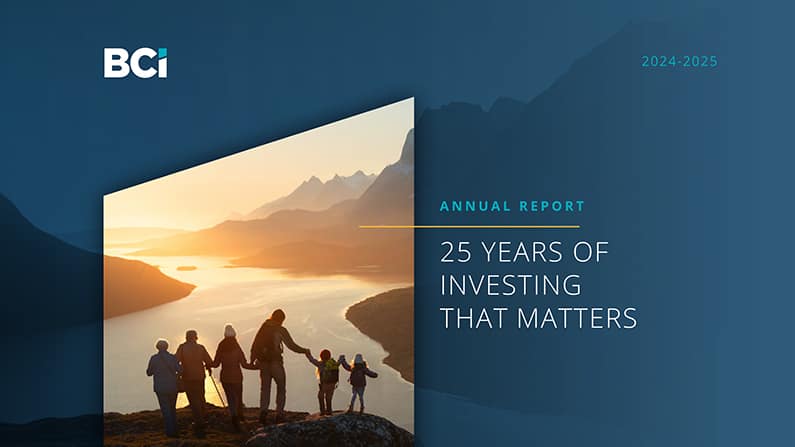
BCI achieved a 10 per cent annual return, surpassing client expectations and further strengthening pension plan surpluses.
As a long-term investor with carefully managed liquidity, BCI is well-prepared to weather ongoing geopolitical headwinds through our sound, purpose-built strategy.
Fiscal 2025 was characterized by ongoing macroeconomic volatility, including heightened geopolitical risks, increased inflationary pressures, and abrupt trade and tariff policy shifts that roiled markets and strained international relations.
For many of BCI’s seasoned investment professionals, the resulting sudden market shifts were reminiscent of the 2008 Global Financial Crisis and other past bear markets.
This prepared us for the current environment, and we leveraged our bench strength and ample liquidity to capitalize on the opportunities that can arise during turbulent times.
Against this backdrop, our resilient investment strategy, aligned with our clients’ long-term investment needs, provided strong returns, further adding to the actuarial surpluses in client plans. BCI’s gross assets under management reached a new high of $295 billion, with net investment income of $21.9 billion. The combined pension plan returned 10 per cent for fiscal 2025, exceeding the average client actuarial rate of six per cent.
Nearly all asset classes delivered strong results, in both absolute and relative terms. Our Private Debt and Infrastructure & Renewable Resources assets were noteworthy performers. Over the course of the fiscal year, these programs increased their focus on high-growth Asian markets with Private Debt seeking investment opportunities with attractive yields and diversification benefits, while Infrastructure & Renewable Resources made its first direct investment in Japan.
Private Equity and Real Estate Equity underperformed their respective benchmarks. Although Private Equity delivered a robust 13.4 per cent return, it missed its 30.1 per cent benchmark which was driven by strong public equity returns and the Magnificent Seven AI-related companies. BCI’s Real Estate portfolio, managed by QuadReal, also underperformed its 6.8 per cent absolute return benchmark by 8.5 per cent, though it remained impressive compared to Maple 8 peers in these difficult market conditions.
From a longer-term perspective, BCI continues exceeding actuarial discount rates, with client funding ratios ranging from 103 to 133 per cent. However, given the lingering uncertainty around global trade and the investment environment, we may face several tough years ahead. We are closely monitoring developments, actively modelling client portfolios against potential scenarios, and briefing clients on risk-reduction strategies designed to help mitigate geopolitical and trade uncertainty impacts.
Operating on a global scale
This year, we released a new three-year business plan, focused on three ambitions: Driving Sustainable Growth, Accelerating Innovation, and Operating on a Global Scale. In pursuit of the latter ambition, we continue to expand our footprint globally. In fiscal 2025, we established a new European Private Equity hub in London, which will strengthen access to deals and help attract talent, while equipping us to operate in closer proximity to our already sizeable holdings in the region. About $11.5 billion of BCI’s $33.6 billion Private Equity portfolio is currently invested in Europe, while more than 50 per cent of our Infrastructure and Renewable Resources assets are outside North America.
In an era of great volatility and restructuring of international trade relations, diversification and adaptability become crucial for long-term portfolio resilience. Beyond our growing New York and London offices, we now maintain a small Mumbai team overseeing investments in India, the Philippines and Middle East, while scouting out ASEAN opportunities.
Innovation and the challenge of change
Innovation is a part of our everyday operations. Across the organization, our teams are busy integrating AI into their workflows, transforming the way we work and deliver value. Our investment professionals utilize AI-powered interactive deal rooms, rapidly extract actionable insights from thousands of unstructured documents to strengthen analysis, and conduct technology security reviews with unprecedented speed. We’re also preparing BCI to be post-quantum ready, ensuring our data and systems remain secure.
ESG — Responsible investing
As an active asset manager, BCI monitors ESG factors and engages with regulators and companies to promote effective long-term risk management through good corporate governance. Our commitment to ESG remains firm, regardless of shifting political winds or anti-ESG sentiment in some corporate and political realms.
BCI continues to be a leader in this space, recognized as one of only five among 200 institutional investors to achieve a perfect Governance, Sustainability and Resilience score from Global Sovereign Wealth Fund. In October 2024, we released our first public Stewardship Report, detailing how BCI uses influence and ownership rights to drive responsible performance with our portfolio companies. I’m also proud to report that BCI has already exceeded our 2025 objective of $5 billion in sustainable bond investments, reaching $6 billion.
BCI Welcomes Four Pillars Society as a new client
This year, BCI was awarded a $2 billion investment mandate by The Four Pillars Society (TFPS), a not-for-profit organization established following a class-action lawsuit settlement against the Government of Canada. TFPS represents 325 First Nations across Canada, with settlement funds to be invested to support the revitalization of the crucial “Four Pillars” of language, culture, heritage, and well-being. TFPS Executive Director, Cliff Fregin, called the BCI relationship “a milestone in the management of Indigenous capital in Canada” that will “help ensure we can continue to empower Indigenous communities to preserve what matters most.”
We are deeply honoured by this partnership and continue evolving our practices and deepening organizational understanding of Reconciliation. This also marked the second year of BCI’s Indigenous Empowerment Award scholarship program, which provides participants with financial support as well as hands-on asset management experience. We plan to expand the program through partnerships with post- secondary institutions, to eventually welcome Indigenous students from across Canada.
British Columbians’ investment needs remain paramount
While BCI continues to grow into a truly global asset manager, the investment needs of our clients and the British Columbians they serve remain the focal point of BCI’s operations and decision-making. Thirty-eight per cent or $112 billion of BCI’s $295 billion gross assets under management are invested in Canada. We would consider further increasing our Canadian investment exposure if the right opportunities involving airports and other infrastructure became available.
25 years of clients first — Investing that matters
As 2025 unfolds, BCI celebrates its 25th anniversary. Founded through the Public Sector Pension Plans Act, BCI generates investment returns to help secure financial futures for more than 750,000 pension beneficiaries. A Canadian Centre for Economic Analysis study found that BCI’s ecosystem—encompassing retirement benefits, insurance payments, business operations, and private investments—drives 5.9 per cent of the B.C. economy, supporting over 225,000 jobs and generating $12.2 billion in wages. Today, all B.C. plans are fully funded and in surplus — well administered, well run and well respected.
In closing
I would like to acknowledge a tragic occurrence at QuadReal’s Oakridge Park development site in Vancouver, which claimed the life of 41-year-old construction worker Yuridia Flores, a mother of two. This tragedy reminded us that while financial losses may be part of the investment business, human life loss cannot be tolerated. On behalf of everyone at BCI and QuadReal, I extend our condolences to Ms. Flores’ family and loved ones.
Finally, I commend the remarkable professionals throughout this organization whose collective efforts enable us to derive order from a chaotic macroeconomic environment and honour our commitments to clients and partners. Having earlier mentioned the bench strength of our professionals, I wish to reiterate that BCI clearly benefits from our executive leadership team’s stability and experience. In times like these, it’s good to be surrounded by trusted people who have previously navigated difficult and volatile periods.
I would like to thank the Board for its valuable support over the past year, and to recognize Sheila Taylor, who retired after six years of dedicated service as a Board Director and Chair of the Human Resources and Governance Committee.





 By Josh Welsh
By Josh Welsh







